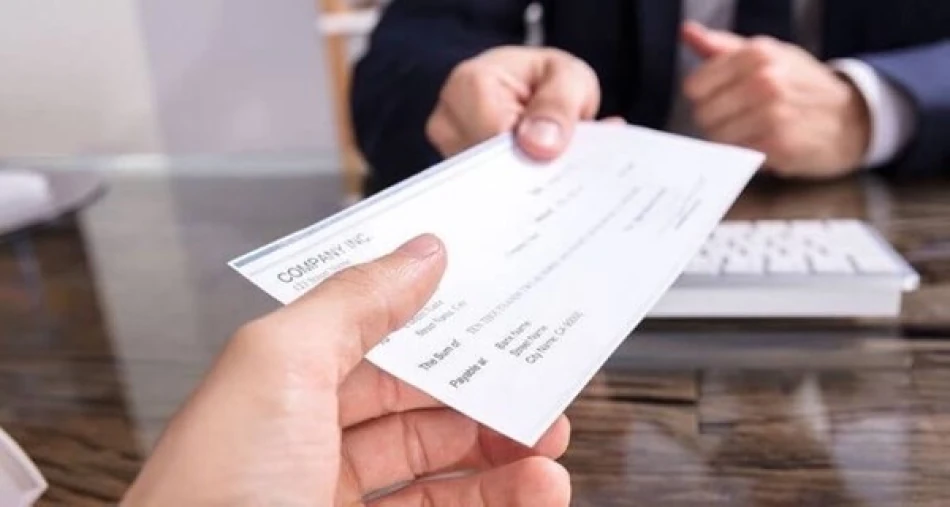
Bounced Checks: 7 Vital Facts About Partial Payment Compliance
UAE Banks Embrace Partial Check Payments as Digital Revolution Challenges Paper-Based Finance
The UAE's banking sector has formalized partial check payment procedures to address bounced checks due to insufficient funds, offering creditors a pragmatic solution to recover available amounts while maintaining legal recourse for the remainder. This development comes as traditional paper checks face an existential challenge from digital payment systems, with check usage plummeting to just 0.01% of global payments from 85% in the 1980s.
How Partial Check Payments Work in Practice
Under UAE Central Bank guidelines, banks now allow beneficiaries to collect whatever funds are available when a check bounces due to insufficient balance. The process requires the check holder to visit the issuing bank directly, where they can request partial payment up to the available account balance.
When processing partial payments, banks stamp the original check's back to confirm the transaction and provide a certificate detailing the check writer's identification number, IBAN, phone number, and complete address. Importantly, the original check remains with the beneficiary, who retains full legal rights to pursue the remaining amount.
Fees and Limitations
Banks charge an administrative fee of 5 dirhams (excluding 5% VAT) for each partial payment transaction, deducted from the check writer's account. The service is only available at main branch teller counters and requires the original bounced check plus valid Emirates ID or passport.
Check holders maintain the right to claim remaining amounts until the check expires—180 days from the issue date—and can pursue legal action against check writers even after accepting partial payments.
Legal Framework Evolution Addresses Market Reality
Legal consultant Ammar Anis notes that partial check payments have emerged as a critical issue in recent years due to increased reliance on checks alongside rising cases of insufficient funds. The UAE legislature has responded with significant amendments to commercial transaction laws.
Federal Law No. 50 of 2022 introduced Article 648, which explicitly regulates partial payments and removes previous legal ambiguities. This legislative evolution demonstrates the UAE's adaptive approach to financial regulation, balancing creditor protection with banking system stability.
Regional Context and Comparative Approach
Different jurisdictions handle partial check payments differently. Some countries mandate banks to pay available amounts to protect creditor rights, while others—like the UAE—give check holders the choice to accept or reject partial payment. This optional approach reflects the UAE's business-friendly regulatory philosophy, similar to frameworks in Singapore and other international financial centers.
The Digital Payment Revolution Threatens Check Relevance
Financial expert Hussein Al-Qamzi, former CEO of Noor Bank and Noor Takaful, emphasizes that modern technology offers permanent solutions to traditional banking challenges. The dramatic decline in check usage—from 85% of non-cash payments in the 1980s to 0.01% globally today—signals an irreversible shift toward digital transactions.
Electronic payments provide superior speed, security, and efficiency compared to paper checks, which require days for clearance. This technological transformation mirrors global trends, with governments and banks worldwide planning to phase out personal checks by 2027.
Market Implications for Financial Institutions
For UAE banks, partial check payment procedures represent a transitional solution addressing legacy payment methods while digital infrastructure expands. This approach reduces commercial disputes, eases court system pressure, and maintains confidence in checks as temporary payment instruments.
However, the long-term trajectory clearly favors digital alternatives. Banks investing heavily in mobile payment platforms, instant transfers, and blockchain-based settlement systems are positioning themselves for a post-check financial ecosystem.
Strategic Outlook: Managing the Transition
The UAE's partial check payment framework demonstrates sophisticated regulatory thinking—providing immediate practical solutions while acknowledging the technology-driven transformation of financial services. This balanced approach protects existing commercial relationships while encouraging adoption of more efficient payment methods.
For businesses and individuals, the message is clear: while partial check payments offer valuable short-term protection, the future belongs to instant, digital transactions that eliminate the fundamental problems checks create. Smart financial planning increasingly means reducing dependence on paper-based payment instruments in favor of real-time digital alternatives.
Most Viewed News

 Layla Al Mansoori
Layla Al Mansoori






